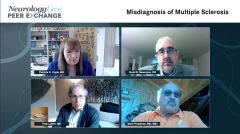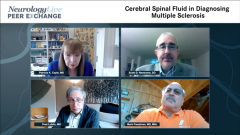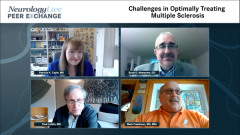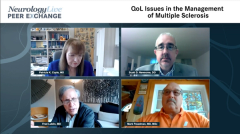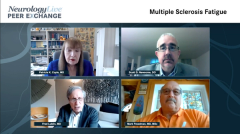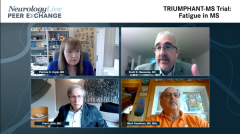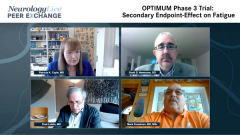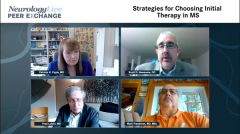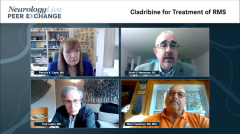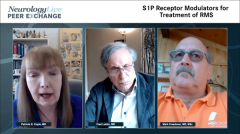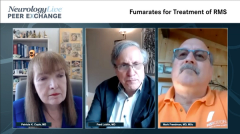
Anti-CD20 Monoclonal Antibodies for Treatment of RMS
Episodes in this series

The rationale for using anti-CD20 monoclonal antibodies ofatumumab and ocrelizumab for treatment of relapsing multiple sclerosis is discussed.
Fred Lublin, MD: Let’s look at some of our therapies. We have our oldest therapies, which are interferon and glatiramer acetate. I’ve had not 0, but precious few, interferon starts. We have had starts with glatiramer acetate. It’s been around for a long time, and it works for some patients. The group of patients who are most interested in that are the people who come in and ask, “What’s the safest drug you have, and how long has that drug been around?” Glatiramer acetate fills the bill on that and satisfies those for whom safety is the biggest concern.
Moving into some of the others, we can look at the other end of the spectrum. The highest-efficacy agents we have are things like the anti-CD20 therapies. Scott wanted to discuss ocrelizumab and ofatumumab.
Scott D. Newsome, DO: Let’s talk about the 50,000-foot view with regard to B cells. For a number of years, it was thought that MS [multiple sclerosis] was just a T-cell-driven disease. But over the past decade or longer, it’s been recognized that B cells are integral to the pathogenesis of MS.
If you look at the fundamentals of immunology, we know B cells are the main antigen-presenting cell to T cells. In a disease where T cells are heavily involved, how do they get activated and how do they misbehave? In part, it’s because B cells have that antigen presentation and 2 T cells to activate them. That has been recognized for a long time.
We know that antibodies are produced by plasma cells. What are the precursors of plasma cells? They’re the B cells. We know that antibodies are a part of the pathogenesis of MS. They can do direct damage to axonal myelin. If we think about what other things B cells do, they cause proinflammatory cytokines. There was mention of cytokines earlier. Those cytokines can activate additional immune cells, including the innate immune system.
You have B cells, which have an integral part in the pathogenesis of MS. What if we directly target B cells? That’s where ocrelizumab and ofatumumab have come down the pipeline, and we also have rituximab. That’s been around for decades. We’ve used that in neuroinflammatory conditions.
If we look at the OPERA I and OPERA II clinical trials, which were the pivotal trials for ocrelizumab vs interferon beta-1a given 3 times a week, we saw clear evidence on all markers of disease activity that ocrelizumab was superior to interferon. For example, the annualized relapse rate was close to 50% in favor of ocrelizumab.
Then, if we look at the Gad-enhancing lesions, there was very strong suppression of new Gad-enhanced lesions. That measure favored ocrelizumab by more than 90%, which surprised me. I’d like to hear if others felt similarly. If you look at the pivotal trials with interferon, it does a pretty good job of suppressing inflammation, as it relates to new Gad-enhancing lesions, into the 80th percentile. Now, you have a B-cell–depleting therapy with which you’re suppressing into the 90th percentile. It’s really impressive by those metrics. Other secondary end points were met as well.
If we shift our attention to ofatumumab—this study was vs teriflunomide, not interferon—there were similar results, in terms of suppression of annualized relapse rate into the 50th percentile. It was similar in terms of suppressing Gad-enhancing lesions into the greater-than-90th percentile if you’re going to compare the 2 pivotal trials between the B-cell–depleting therapies.
If we look at the disability data, how good were the B-cell–depleting therapies vs their active comparator in suppressing that disability measured by EDSS [Expanded Disability Status Scale]? If we look at the ocrelizumab data—they’re pooled—there was 40% reduction if I recall correctly vs interferon. For ofatumumab, it was around 30% reduction in disability progression.
As I mentioned earlier, will we start to see those curves coming closer together as someone is on their respective therapies long term, from a disability perspective? But at least short term, and probably intermediate term, we know that the B-cell–depleting therapies do a much better job in suppressing the inflammatory disease activity. That includes relapses, Gad-enhancing lesions, and T2 lesions, which may speak to those observational studies that I referenced. I don’t know how others feel about the data. They’re compelling enough for me to think about using the B-cell–depleting therapies as a first line.
Mark Freedman, MD, MSc: I had some comments about the B cells as well. I’ll just throw in a caveat that, at some point in your life, you might need a B cell. The untold story and the data that we need are concerning how long you need to suppress the B cells to obtain a long-term response. You may not need to maintain the barrage against the B cells year after year. There may be a point where you can stop and still glean the benefit from those early treatments.
Scott D. Newsome, DO: The Swedish folks have published a number of good studies with rituximab. You can argue back and forth about ocrelizumab and ofatumumab. Maybe they’re different drugs, but you’re still targeting B cells. They have shown that you can treat up front with a protocol that’s similar for a couple of years and then back off on either the frequency or the dosing. You still have a good therapeutic response, and maybe that will help prevent some of the long-term complications. I totally agree with that approach.
Also, Annette Langer-Gould has also been involved, at least in the United States, in looking at similar data from Kaiser Permanente showing that you don’t have to continue to flog the B cells the same way for a very long period of time. We’ll have to see. The long term will help prevent further disease activity. We don’t have those data yet.
Patricia K. Coyle, MD: I’ll just mention with regard to the anti-CD20s that we now have 2 competitive, high-efficacy, relatively safe agents. One can be given at home. For the other, you go to an infusion center. We’re likely to have a third. We certainly use anti-CD20 agents in treatment-naïve individuals. It’s very well tolerated and a great choice. We are monitoring immunoglobulins on an annual basis. There is a concern, and it may very well be that we don’t need to continue to give it at the same pace. That needs to be determined.
Newsletter
Keep your finger on the pulse of neurology—subscribe to NeurologyLive for expert interviews, new data, and breakthrough treatment updates.


